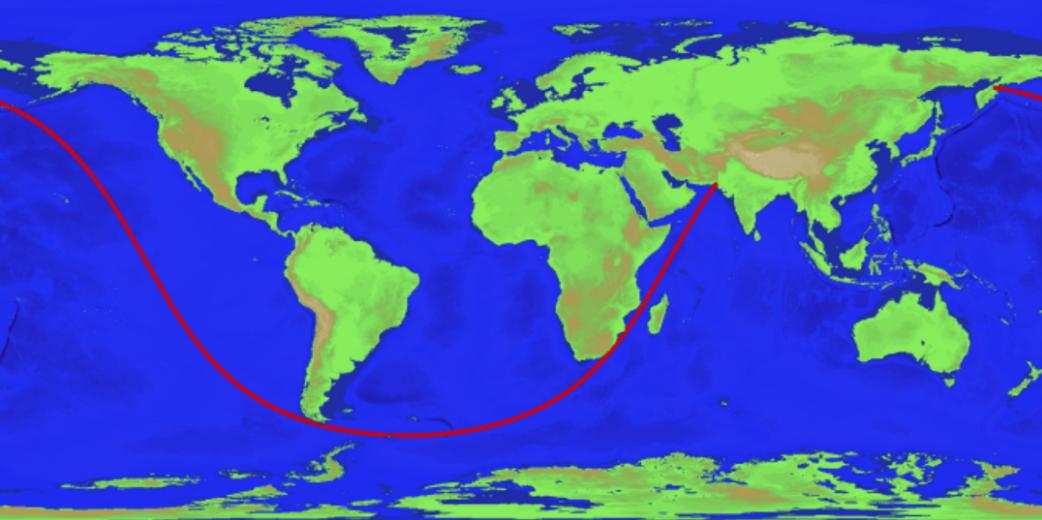
Imagine you are sailing on the ocean but your boat is incapable of turning. What would be the longest straight path you could take without hitting land?
This question was the focus of a post that sparked much debate back in 2012 on Reddit. On the subreddit /r/MapPorn, a user known as kepleronlyknows shared a map of the world supposedly showing the longest straight-line journey possible on Earth—an overseas path stretching more than 32 089.7 kilometers (19939.6 miles) from southern Pakistan to northeastern Russia.
A number of users made attempts to prove or disprove the claim, while others discussed how to solve the problem of determining the longest distance that can be traversed on land without hitting a major water body.
(In case you were wondering how a seemingly curved line on a map could actually be straight, kepleronlyknows also posted a video, seen below, explaining the concept using Google Earth).
After coming across the debate, computer scientists Rohan Chabukswar from the United Technologies Research Center in Ireland and Kushal Mukherjee at IBM Research India set out to test the claim—and it turns out kepleronlyknows was correct, according to a new study published on the pre-print server arXiv.org.
The duo looked at data from the National Oceanic and Atmospheric Administration's Global Relief Model of Earth's surface, which shows the entire planet at a resolution of around 1.8 kilometers.
One way you could calculate the longest straight-line path over the ocean is by investigating every possible great circle—one of the many imaginary circles that extend across the maximum distance around a sphere (the equator, for example).
However, at a resolution of 1.8 kilometers (1.1 miles), you would be left with more than 230 billion great circles to consider, each containing around 21,600 individual points to process, meaning more than five trillion points verify in total. This would take a significant amount of time to compute.
So, Chabukswar and Mukherjee decided to develop an algorithm based on a mathematical method known as "branch and bound," which they used to work out the path faster by optimizing the search for solutions.
"The algorithm returned the longest path in about 10 minutes of computation for water path, and 45 minutes of computation for land path, on a standard laptop," the researchers wrote in the study.
Their results were visually the same as the straight line found by kepleronlyknows. This path originates in Sonmiani, Balochistan, Pakistan, before traveling between Africa and Madagascar, then Antarctica and Tiera del Fuego in South America, and finally ending in Karaginsky District, Kamchatka Krai, Russia.
The duo also calculated the longest straight-line path over land, finding that it begins near Jinjiang, Fujian, in China and ends close to Sagres in Portugal, after passing through Mongolia, Kazakhstan, Russia, Belarus, Ukraine, Poland, Czech Republic, Germany, Austria, Liechtenstein, Switzerland, France, and Spain—a distance of over 11 241.1 kilometers (6984.8 miles).
The authors stress that the problem was approached purely as a mathematical exercise and they do not recommend sailing or driving along the paths that they calculated.
Uncommon Knowledge
Newsweek is committed to challenging conventional wisdom and finding connections in the search for common ground.
Newsweek is committed to challenging conventional wisdom and finding connections in the search for common ground.
About the writer
Aristos is a Newsweek science reporter with the London, U.K., bureau. He reports on science and health topics, including; animal, ... Read more
To read how Newsweek uses AI as a newsroom tool, Click here.





